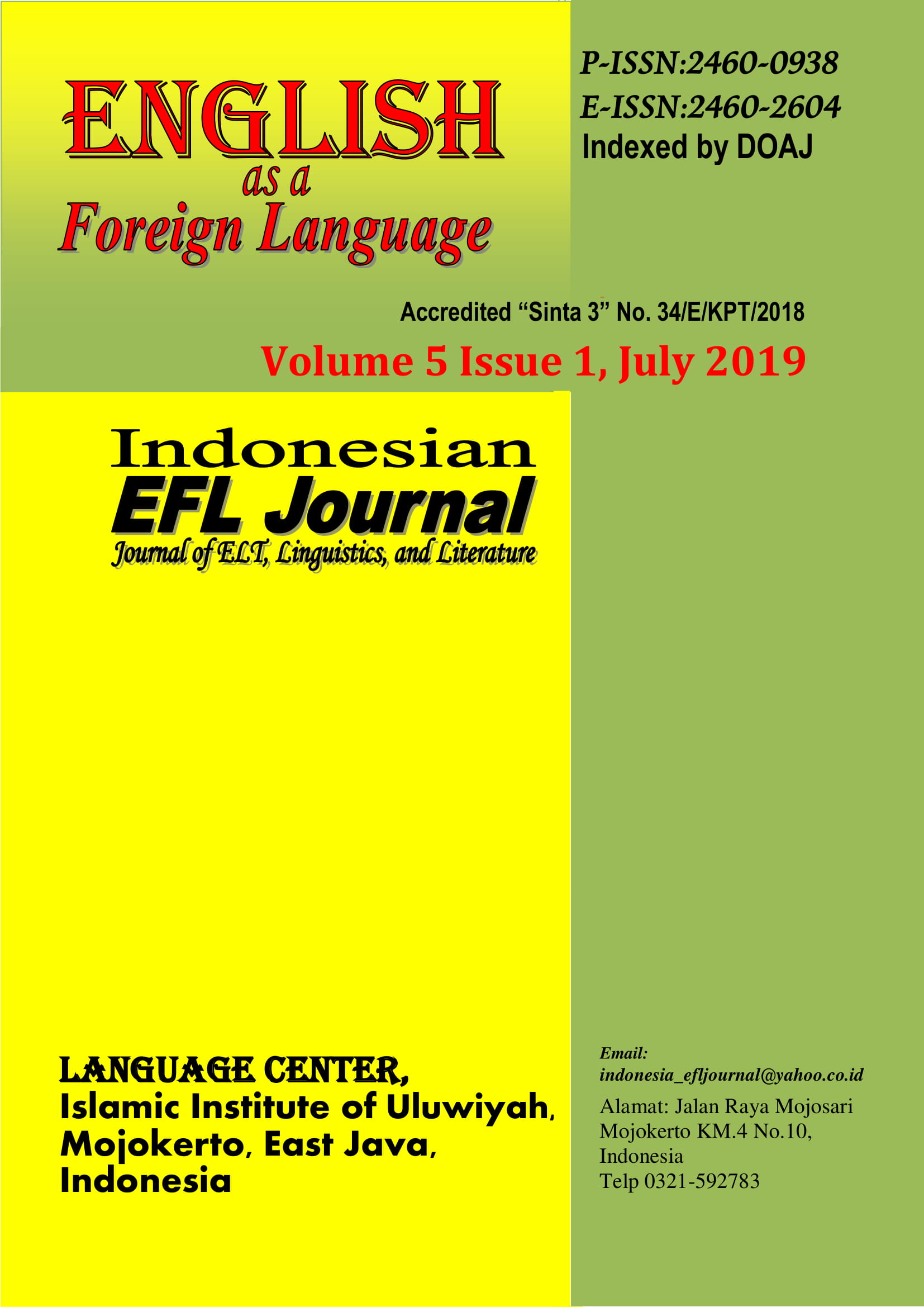Teams-Games-Tournament (TGT) to Teach Vocabulary of English for Specific Purpose in Increasing Students’ Self-Esteem
Abstract
The objective of this study was to investigate the implementation of playing game on students’ mastery on vocabulary of ESP viewed from self-esteem in producing words. The investigation were: (1) to know whether Teams-Games-Tournament (TGT) was more effective than Grammar Translation Method (GTM) to teach vocabulary of ESP; (2) to know whether the students whose self-esteem was high had better vocabulary of ESP mastery than those who had low self-esteem; and (3) to prove whether there was an interaction between teaching methods and self-esteem to teach vocabulary of ESP.
The research design used for the research was a simple factorial design 2 x 2. Simple Random sampling was used to select 48 students of two classes. Meanwhile, in determining the sample into the experimental and control class, the researcher chose the class randomly. The data were analyzed by using multifactor analysis of ANOVA 2x2 and Tuckey test.
The findings of this research revealed: (1) TGT was more effective than GTM in teaching vocabulary of ESP. (2) The students who were taught by TGT had higher vocabulary mastery than those who were taught by GTM. (3) The students having high self-esteem had better ESP vocabulary than those of students with low self-esteem. It is concluded that: 1) Teams-Games-Tournament is more effective than GTM in teaching vocabulary of ESP; 2) The students having high self-esteem have better vocabulary of ESP mastery than those having low self-esteem; 3) There was interaction between teaching methods and students’ self-esteem
References
Ahmed, M.K. (2014). Issues in ESP (English for Specific Purposes). International Journal for Teachers of English, 4 (1): 36-5
Aqel, M.I. (2013). The Effect of Using Grammar-Translation Method on Acquiring English as A Foreign Language. International Journal of Asian Social Science 3(12): 2469-2476.
Bari, K.A., Sana, M.H., & Sadia, M. (2015). The Effectiveness of Gramar Translation Method in Teaching and Learning of English Language at Intermediate Level. International Journal of Multidisciplinary Research and Modern Education, 1(1): 2454-6119.
Birch-Bécaas, S., & Hoskins, L. (2017). Designing and implementing ESP Courses in French Higher Education: a Case Study. In C. Sarré & S. Whyte (Eds), New Developments in ESP Teaching and Learning Research (pp. 51-69). Research Publishing.net. https://doi.org/10.14705/rpnet.2017.cssw2017.745
Elliot, A., Faler, J., McGregor, H., Campbell, W., Sedekides, C., &Harackiewicz, J. (2000). Competence Valuation as a Strategic Intrinsic Motivation Process. Personality and Social Psychology Bulletin, 26(7), 780-794
Fengfeng, K., & Barbara, G. (2007). Game-playing for Maths Learning: Cooperative or not?. British Journal of Educational Technology, 38(2): 249-259.
McKeown, M. G. (1993). Creating Effective Definitions for Young Word Learners.Reading Research Quarterly. Cambridge: Harvard University Press.
O’Dea, Jennifer, A., & Suzanne, A. (1999). Improving the Body Image, Eating Attitudes, and Behaviors of Young Male and Female Adolescents: A New Educational Approach that Focuses on Self-Esteem.
Orth, U., & Richard, R.W. (2014). The Development of Self-Esteem. Journal of Psychological Science, 23(5): 381-387.
Salam, A., Rahman, S., & Anwar, H. (2015). Teams Games Tournaments (TGT). Cooperative Technique for Learning Mathematics in Secondary Schools in Bangladesh. Journal of Research in Mathematics Education 4 (3): 271-287.
Tskhvitava’. (2016). Vocabulary Learning Strategies of English for Specific Purposes Students at Agricultural University of Georgia. Journal of Education in Black Sea Region 2 (1): 130-138.
Veloo, A, Ruzlan, M.A, & Sitie, C. (2016). Using Cooperative Teams Game-Tournament in 11 Religious School to Improve Mathematics Understanding and Communication 1. Malaysian Journal of Learning and Instruction, 13 (2): 97-123.
Whyte, S., & Sarré, C. (2017). Introduction to New Developments in ESP Teaching and Learning Research. In C. Sarré& S. Whyte (Eds), New Developments in ESP Teaching and Learning Research (pp. 1-12). Research Publishing.net. https://doi.org/10.14705/rpnet.2017.cssw2017.742
Copyright (c) 2019 Indonesian EFL Journal: Journal of ELT, Linguistics, and Literature

This work is licensed under a Creative Commons Attribution-ShareAlike 4.0 International License.
All rights reserved.
this publication may be reproduced, stored in a retrieval system, or transmitted
in any form or by any means, electronic, mechanical, photocopying, recording.




